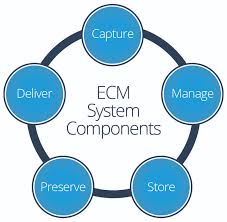
The Power of Enterprise Content Management Platforms
Enterprise content management (ECM) platforms have revolutionized the way organizations manage, store, and access their digital content. These powerful tools provide a centralized solution for capturing, storing, organizing, and retrieving a wide range of content types across an organization.
One of the key benefits of an ECM platform is its ability to streamline business processes by enabling seamless collaboration and information sharing among employees. With features such as document management, workflow automation, version control, and search capabilities, ECM platforms empower organizations to improve efficiency, productivity, and decision-making.
Furthermore, ECM platforms enhance data security and compliance by enforcing access controls, encryption protocols, and audit trails to protect sensitive information from unauthorized access or breaches. This ensures that organizations can meet regulatory requirements and maintain data integrity with confidence.
Another advantage of ECM platforms is their scalability and flexibility to adapt to the evolving needs of an organization. Whether it’s managing documents, images, videos, emails, or other forms of content, ECM platforms offer customizable solutions that can be tailored to specific industry verticals or business processes.
In today’s digital age where information overload is a common challenge for enterprises, having a robust ECM platform in place is essential for effectively managing the volume and variety of content generated daily. By centralizing content storage and providing advanced search functionalities, ECM platforms enable users to quickly locate relevant information when needed.
Overall, enterprise content management platforms play a critical role in optimizing organizational workflows, enhancing collaboration among teams, ensuring data security and compliance, and improving overall efficiency in managing digital content. As businesses continue to embrace digital transformation initiatives, investing in an ECM platform has become a strategic imperative for staying competitive in today’s fast-paced business landscape.
Unlocking the Power of Organization: A Guide to Enterprise Content Management Platforms
- What is an example of ECM?
- What is enterprise content management platform?
- What is enterprise CMS?
- What is ECMS used for?
What is an example of ECM?
An example of an Enterprise Content Management (ECM) platform is Microsoft SharePoint. SharePoint is a versatile ECM solution that offers a wide range of features for document management, collaboration, workflow automation, and content organization. Organizations can use SharePoint to store, share, and access various types of content securely while facilitating seamless communication and collaboration among teams. With its user-friendly interface and integration capabilities with other Microsoft products, SharePoint serves as a popular choice for businesses looking to streamline their content management processes and enhance productivity across the enterprise.
What is enterprise content management platform?
An enterprise content management platform is a comprehensive software solution designed to help organizations effectively capture, store, manage, and retrieve a wide range of digital content across the enterprise. It serves as a centralized hub for documents, images, videos, emails, and other content types, offering features such as document management, workflow automation, version control, and search capabilities. By providing tools for collaboration, information sharing, data security, and compliance management, an ECM platform streamlines business processes and enhances productivity within an organization. In essence, an ECM platform acts as a digital repository that enables seamless access to critical information while ensuring data integrity and regulatory compliance.
What is enterprise CMS?
Enterprise CMS, or Enterprise Content Management System, is a comprehensive software solution designed to help organizations effectively manage and organize their digital content across various departments and functions. It serves as a centralized platform for storing, retrieving, and sharing a wide range of content types, including documents, images, videos, and more. Enterprise CMS streamlines workflows, enhances collaboration among teams, improves data security and compliance measures, and boosts overall efficiency in handling digital content within an organization. By providing robust features such as document management, version control, search capabilities, and workflow automation, enterprise CMS empowers businesses to optimize their content management processes and adapt to the evolving demands of the digital age.
What is ECMS used for?
An enterprise content management system (ECMS) is used for centralizing, organizing, and managing various types of digital content within an organization. It serves as a comprehensive platform that enables businesses to capture, store, retrieve, and share documents, images, videos, emails, and other forms of content efficiently. ECMS facilitates collaboration among employees by providing a structured framework for workflow automation, version control, and document management. Additionally, ECMS enhances data security and compliance through access controls, encryption protocols, and audit trails to safeguard sensitive information. Overall, ECMS is instrumental in streamlining business processes, improving productivity, ensuring regulatory compliance, and enhancing overall efficiency in managing digital content across the enterprise.
